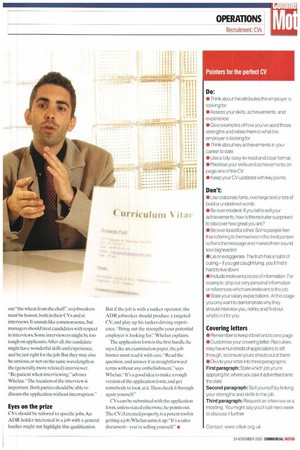PUT OUT THE RIGHT MESSAGE
Page 70

Page 71

If you've noticed an error in this article please click here to report it so we can fix it.
The road transport job market relies heavily on word of mouth, but candidates should still prepare effective CVs and covering letters. Tim Maughan finds out what this entails.
Driver shortages are well documented: operators need to draw up strategies if they are to attract the right staff.That said, HGV drivers might still want to secure a particular, much sought-afterjoband a well constructed CV can be a vital tool in gaining an interview. On the other hand, it's in the operator's interest to conduct job interviews fairly and professionally.
Trevor Whelan is transport policy manager at the Chartered Institute of Logistics and Transport which has 21.000 members, twothirds of whom work in the logistics and supply-chain sector."We're trying to re-engage with employers, in the interests of professional development," says Whelan.The CILT can also audit members businesses in a bid to improve their personnel's skills.
The road transport sector relies heavily on
word of mouth when it conies to finding new jobs, so it's easy to forget the formalities. "In my experience drivers don't have CVs, and they are very rarely encouraged to have them," Whelan reports." Drivers should have a CV, keep it updated. and get a reference when they leave the company. If the employer has been happy with the driver, they shouldn't take exception to this.
Maximise your chances
Transport managers in the smaller transport firms have often progressed from driving jobs, he points out. So they themselves, as tradition dictates, may be reluctant to handle CVs, But they should still produce one,Whelan maintains.Wel I-crafted records can only help secure that coveted job, Your CV should outline personal details,
along with a brief profile. "They should also include a very brief summary of experience to date, education or vocational qualifications, and a history of employment,he adds."You should list potential referees, although letters of reference shouldn't be sent at this stage."
On the other hand, a badly devised CV can ruin an applicant's chances.So where do they go wrong'? "Poor layout and attention to detail," says Whelan.
When you put your profile on paper it's no good being over-modest, but you should also avoid exaggeration: -And your claims of experience should be verifiable." Companies have their own methods of measuring potential interviewees, so applicants should put themselves across as effectively as possible. Whelan points out that larger firms with human resources departments can soon sort out "the wheat from the chaff", so jobseekers must be honest, both in their CVs and at interviews. it sounds like common sense, but managers should treat candidates with respect in interviews. Some interviewers might be too tough on applicants. After all,the candidate might have wonderful skills and experience, and be just right for the job. But they may also he anxious, or not on the same wavelength as the (generally, more relaxed) interviewer. "Be patient when interviewing," advises Whelan. "The location of the interview is important. Both parties should be able to discuss the application without interruption."
Eyes on the prize
CVs should be tailored to specific jobs. An ADR holder interested in a job with a general haulier might not highlight this qualification. But if the job is with a tanker operator, the ADR jobseeker should produce a targeted CV, and play up his tanker-driving experience. "Bring out the strengths your potential employer is looking for," Whelan explains.
The application form is the first hurdle, he says. Like an examination paper, the job hunter must read it with care. -Read the question, and answer it in straightforward terms without any embellishment," says Whelan."It's a good idea to make a rough version of the application form, and get somebody to look at it.Then check it through again yourself."
CVs can be submitted with the application form, unless stated otherwise, he points out. The CV, if created properly, is a potent tool in getting a job. Whelan sums it up:"It's a sales document — you're selling yourself." •






































































































































































































